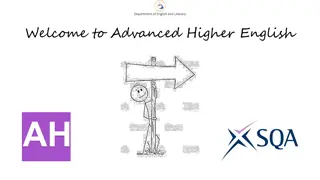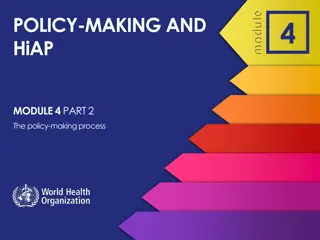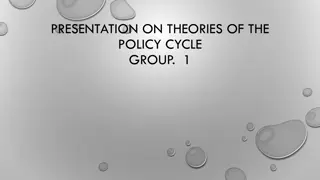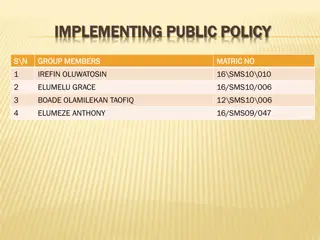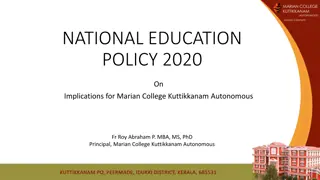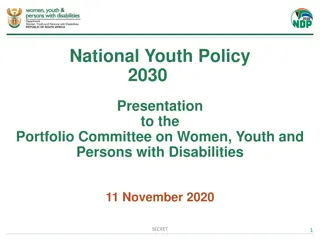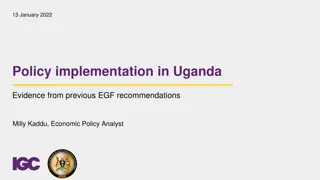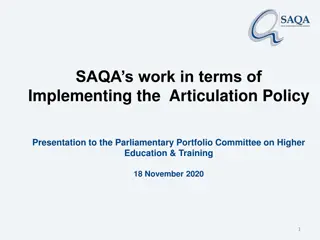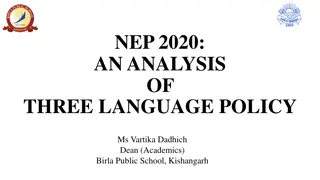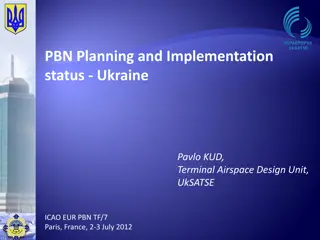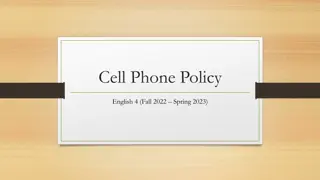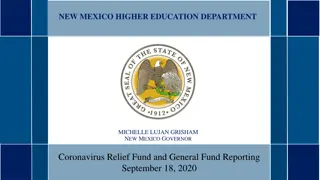Overview of National Education Policy 2020 and its Implementation in Higher Education
The National Education Policy 2020 (NEP 2020) brings significant changes to the higher education system in India, including a shift to a 3 to 4-year undergraduate program, semester-based learning with multiple exit and entry points, and the introduction of a Choice Based Credit System (CBCS). The policy emphasizes holistic development and allows students to earn credits from platforms like SWAYAM and MOOCS. The comparison with the previous policy highlights key differences such as the inclusion of honors programs, internship systems, and assessment methods. The new system also provides a structured semester-wise promotion criteria and opportunities to clear backlog courses through special exams.
- National Education Policy
- NEP 2020
- Higher Education
- Semester-Based Learning
- Choice Based Credit System
Download Presentation

Please find below an Image/Link to download the presentation.
The content on the website is provided AS IS for your information and personal use only. It may not be sold, licensed, or shared on other websites without obtaining consent from the author. Download presentation by click this link. If you encounter any issues during the download, it is possible that the publisher has removed the file from their server.
E N D
Presentation Transcript
NATIONAL EDUCATION POLICY 2020
NEP 2020 DEPARTMENT OF HIGHER EDUCATION CHHATTISGARH one state one ordinance Implementation from session 2024-24 in UG program. B.A., B.Sc., B.Com., B.B.A. And B.C.A. Under Graduate Program . 3 or 4 years Under Graduate Program. Semester Based (6 months teaching and learning total 6/8 Sem.) Multiple Exit and multiple entry (max. 7 years capping)
CONTINUED.... Choice Based Credit System ( CBCS). Student can earn credit from SWAYAM and MOOCS platforms. Academic bank of credit (ABC) ID is compulsory for all students. multidisciplinary system Private students also comes under the NEP 2020. Holistic development of students.
COMPARISON NATIONAL EDUCATION POLICY 1986 NATIONAL EDUCATION POLICY 2020 Only 3years UG program 3 or 4 years UG program Annual Pattern Semester Pattern No Credit based Credit based Choice System No internal assessment Internal assessment No Honours Program Honours or Honours with Research Program Internship system No Internship system Not allow to exit Multiple exit and multiple entry
SEMESTER Semester -1 20 credit Certificate ( 44 credit) First Year 40 credit Semester -2 20credit
Continued.... Semester - 3 20 credit DIPLOMA ( 84 credits) Second Year 40 credits Semester - 4 20 credit Semester - 5 20 credit DEGREE ( 120 credit) Third Year 40 credits Semester - 6 20 credit
Continued... HONOURS DEGREE ( 160 credit) OR HONOURS WITH RESEARCH ( 164) Semester - 7 20 credit Fourth Year 40 credits 20 credit or 24 credit Semester - 8
SEMESTER WISE PROMOTION Odd semester: 1, 3, 5 Direct Promotion Even semester: 2, 4, 6 SEMESTER - 3 SEMESTER -2 Earn min. 50% credits in 1+2 Sem. SEMESTER - 5 1. Earn min. 50% credits in 3+4 Sem. 2. Must have cleared 1and 2 Sem. SEMESTER-4
Continued.... No provision of Supplementary Exam or Revaluation Any one can clear their backlog courses in co respective semester exam. Provision of special exam after declaration of 6 semester result to clear any backlog courses of 5 and 6 semester
CREDIT SYSTEM Teaching learning hour s per week. For theory courses 1 Credit --- 1 hour/ Period per week for 15 weeks (total 15 hours in a semester) 2 credit --- 2 hours/ period per week for 15 weeks ( total 30 hours/period in a semester.) 3 credit - -- 3 hours/ periods per week for 15 weeks ( total 45 hours/ period in a semester. 4 credit - -- 4 hours/ period per week for 15 weeks ( total 60 hours/ period in a semester) For Laboratory Work / Field work 1 Credit 2 hours per week ( total 30 hrs / period )
Course Curriculum Framework of UG program ( CCFUP) PROGRAM :- the award for which students are enrolled. ( UG program or PG program, BA Program , B.Sc. Program, B. Com. Program etc.) COURSE :- The papers (Exam) required for the award program. ( History, Geography, Botany, Zoology etc.) COURSE CURRICULUM :- Details of the courses.
COURSE CURRICULUM FRAMEWORK (CCF) A. INTRODUCTION ( course code, type, credit & Learning outcome (LO) B. COURSE CONTENT ( Unit and Credit wise distribution) C. COURSE LEARNING RESOURCES ( Textbook , Reference Book & E Resources) D. COURSE ASSESSMENT ( CIA & ESM , Marks distribution)
CCFUP : Multidisciplinary Courses Discipline Specific Course (Major / Core Course) 1- DSC (4C) Three Courses per semester Compulsory Discipline Specific Elective (Minor Course) 2- DSE (4C) One Courses start from third Sem. Elective type
Continued.... Compulsory for 1 and 2 semester From other faculties subjects of college decided by Principal and staff meeting. 3- GE Generic Elective (4C) For Art faculty students - Science or Commerce subjects For science faculty students Art and commerce subjects For Commerce students - Art and science subjects
Mainly environmental and Hindi , English & other communicative language. 4- AEC Ability Enhancement course (2C) programs 1st 2nd semester EVS 3rd semester English Lang. EVS semester Hindi Lang. English Lan. EVS B.A. B.Sc. Hindi Lang. English Lang. B.Com. Hindi Lang.
Continued... From the pool received by Higher Education Deportment Raipur/University. 5- VAC Value Addition Course (2C) Decided by the principal and staff meeting according to the college resources . 6- SEC From the pool received by Higher Education Deportment Raipur/University. Skill Enhancement course (2C) Decided by the principal and staff meeting according to the college resources .
GE Pool for Commerce faculty students GE Pool for Art faculty students GE Pool for Science faculty students (As for example) (As for example) (As for example) 1. Zoology 2. Botany 3. Chemistry 4. Mathematics 5. Physics 6. History 7. Geography 8. Economics 9. Sociology 10.Political science 11... 12... 1. Zoology 2. Botany 3. Chemistry 4. Mathematics 5. Physics 6. commerce 7. .. 8. .. 9. .. 1. History 2. Geography 3. Economics 4. Sociology 5. Political science 6. commerce 7. .. 8. .. 9. ..
VAC As for Example ( Pool will be provided by Higher education Department Raipur) Public health and Hygienic Art and culture of India Stress management Investment in stock market Panchayati Raj System Yoga Philosophy Artificial intelligence etc. .. .. ..
CCF for B.A. 1st and 2nd semester ( 1st Year) SEMESTER DSC (4C) A , B & C Major DSE (4C) A/B/C Minor GE (4C) From the pool of college GE 01 (4C) (Zoology) AEC (2C) Hin, Eng., EVS, and other AEC 01 (2C) Hindi Lang. VAC/SEC (2C) From the pool VAC 01 (2C) From the pool Total Credit 1st semester DSC A1 4C (Sociology) DSC B1 4C (Geography) DSC C1 4C (Economics) NA 20 Credit 2nd semester DSC A2 4C NA GE 02 (4C) (Zoology/ot her) AEC 02 (2C) EVS. SEC 01 (2C) From the pool 20 Credit (Sociology) DSC B2 4C (Geography) DSC C2 4C (Economics) Students on exit 44 credit for Under Graduate Certificate (Extra 4 credit of VOC/Skill course have to be earn from recognised platforms . 40 credits
CCF For B.A. 3rd & 4th semester ( 2nd Year) SEMESTER DSC (4C) A , B & C Major DSE / GE (4C) AEC (2C) Hin, Eng., EVS, and other VAC/SEC (2C) From the pool Total Credit 3rd semester DSC A3 4C (Sociology) DSC B3 4C (Geography) DSC C3 4C (Economics) DSC A4 4C (Sociology) DSC B4 4C (Geography) DSC C24 4C (Economics) DSE 01 of A/B/C (4C) Or GE 03 (4C) AEC 03 (2C) Eng. Lang. VAC 02 (2C) From the pool 20 Credit 4th semester DSE 02 of A/B/C (4C) Or GE 04 (4C) AEC 04 (2C) Communicati ve Lang. SEC 02 (2C) From the pool 20 Credit Students on exit 84 credit for Under Graduate Diploma. (Extra 4 credit of VOC/Skill course have to be earn from recognised platforms . 80
CCF For B.A. 5th & 6th semester ( 3rd Year) SEMESTER DSC (4C) A , B & C Major DSE / GE (4C) SEC (2C) From the pool VAC/SEC (2C) From the pool Total Credit 5th semester DSC A5 4C (Sociology) DSC B5 4C (Geography) DSC C5 4C (Economics) DSC A6 4C (Sociology) DSC B6 4C (Geography) DSC C6 4C (Economics) DSE 03 of A/B/C (4C) Or GE 05 (4C) SEC 03 (2C) From the pool VAC 03 (2C) From the pool 20 Credit 6th semester DSE 04 of A/B/C (4C) Or GE 06 (4C) SEC 04 (2C) From the pool Internship (2C) 20 Credit Students on exit shall be awarded Under Graduate Bachelor Degree. 120 credit
CCF for 4th Year (7th and 8th Semester) 1. Bachelor Degree with Honours ( less than 7.5 CGPA) 7th semester DSC -7 A/B/C (4C) DSC -8 A/B/C (4C) Bachelor Degree with Honours Four DSE (4 4C=16C) 20 credit 8th semester Four DSE (4 4C=16C) 20 credit 160 credit 2. Bachelor Degree with Honours and Research ( more than 7.5 CGPA) 7th September DSC-7 A/B/C (4C) Three DSE (3 4C=12C) Research Methodology (4C) Research work Dissertation (4+4C) 20 credit 8th semester DSC-8 A/B/C (4C) Three DSE (3 4C = 12C) 24 credit Bachelor Degree with Honours and Research 164 credit
COURSE ASSESSMENT Course Course credit Max. Marks Min. Passing Marks ( 40%) 40 DSC, DSE and GE 4 credit /3 credit 100 Practicals, AEC, VAC and SEC 1 credit/2 credit 50 20
CONTINUED.... For each Theory and Practical paper CIA ESE (Continuous Internal assessment) (College level) 30% of max. Marks (30 or 15 marks) Two test / quiz (20-20 or 10-10 ) Considered only best mark of two test . One Assignment (10 or 5 marks) Conducted by course teacher (End Semester Examination) (University level) 70% of max. Marks (70 or 35 marks) (Conducted by university )
CIA (Continuous Internal Assessment) At college level Assignment/ seminar/proje ct/field work ( Max. 10 marks) Course code and name Test 1 (Max 20) Test 2 (Max.20) Total Obtained (30 marks) DSC/ DSE/GE ( 4 OR 3 credit) 15 18 8 18+8 = 26 ( Best)
Course code and name Test 1 (Max 10) Test 2 (Max.10) Assignment /field/ project work ( Max. 05 marks) Total obtained (15 marks) AEC/ VAC/SEC/ practical 2 / 1 credit 8 4 9+4 = 13 9 (Best)
ESE (END SEMESTER EXAMINATION) 70% marks of total. Conducted by university Well defined question paper. Objective type, short answer and descriptive answer type questions. 1. Cumulative marks obtained in CIA+ESA Passing Marks (40%) 2. Separately passed both in theory and practical paper.
Later Grade, Grade Point, Credit Points, SGPA and CGPA Later grade SGPA Semester Grade Point Average Denoting rage of obtained marks. (O, A+, A, B+, B, C etc.) (Total credit points divided by Total credit) Grade point Numerical value of Grade. CGPA Cumulative Grade Point Average Credit Points (Total credit points divided by Total credit) (Credit grade point )
Grade point Latter Grade Represent Grade point Range of obtained marks 91 100% 81 - 90% 71 80% 61 70% 51 60% 41 50% 40% Below 40% Absent O A+ A B+ B C P F Ab Outstanding Excellent Very good Good Above average Average Pass Fail Absent 10 9 8 7 6 5 4 0 0
Computation of SGPA and CGPA (B.Sc. First Semester )
credit CIA CIA (obt. ) ESE (Max.) ESE (Obt.) Total max. Total obta. Grade Grade point Credit Points Course code Course (Max.) DSC A1 Chem. 3 30 25 70 50 100 75 A 8 24 Pract. Bot. 1 3 15 30 12 20 35 70 30 45 50 100 42 65 A+ B+ 9 7 9 21 DSC B1 Pract. Zool. 1 3 15 30 10 26 35 70 31 56 50 100 41 82 A+ A+ 9 9 9 27 DSC C1 Pract. Hist. Eng. Lang. A.I. 1 4 2 15 30 15 13 27 11 35 70 35 32 50 20 50 100 50 45 77 31 A+ A B+ 9 8 7 9 32 14 GE-01 AEC-1 VAC-1 Total 2 20 15 10 35 27 50 37 A 8 16 161 SGPA = total credit points total credit = 161 20 = 8.5
CGPA = average of all SGPA = (8.1+7.9+7.5+8.3+7.6+7.8) 6 = 47.2 6 = 7.8 Percent = 10 CGPA
CIA is compulsory for all students (regular and private) for ESE. Time table will be same for classes (1 period = 1 hour). Creating NEP20 Help Desk is necessary for all college . Flexi and banners related to New Education Policy 2020 of Chhattisgarh. To paste the GE and VAC subject list on college notice board to the help of students. To paste the FAQ of Higher Education Deportment on notice board.
Create a new tab for NEP 20 in college website. Daily follow the official website of Higher Education Deportment Raipur for further instructions. Follow the social media platforms of Higher Education Deportment Raipur CG. ( You tube , Instagram, X ( twitter) , Facebook page ))




